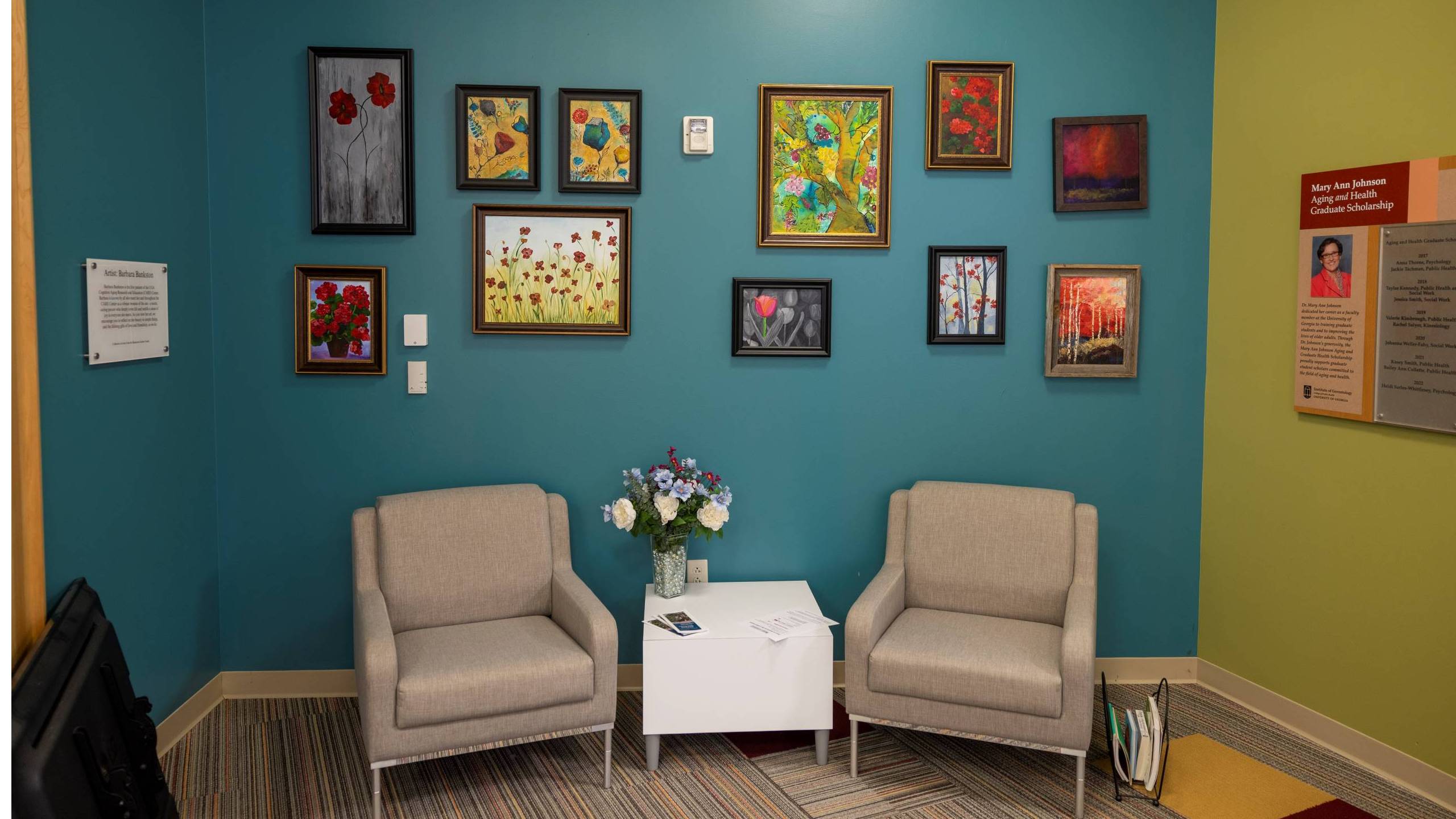It was about halfway through the pandemic lockdown in 2020 when Bill Griswold, 75, noticed that his wife Lyn, 76, seemed to be forgetting conversations they had just had, and that she was always misplacing things.
“Here we were – stuck at home, alone,” he recalls and both unsure what was happening. This went on for about a year. Finally, Griswold, a retired UGA journalism professor, decided that despite the pandemic, “We needed to find a geriatrician.”
His online research eventually led him to Dr. Don Scott, an associate professor of medicine at the Augusta University/UGA Medical Partnership and campus director of geriatrics and palliative care, who, serendipitously, was part of a team that was launching a new clinical, research and outreach center called the Cognitive Aging Research and Education Center (CARE Center). The Center is housed in the UGA Institute of Gerontology, part of the College of Public Health.
“I was so impressed with the way he asked questions,” Griswold says. “He spent a lot of time with us at that first appointment.” Scott then suggested they meet a new professor, Stephen Correia, the Center’s director of neuropsychology. Following a four-hour long neural test, Lyn was diagnosed with mild cognitive impairment or MCI, in which at least one cognitive domain, usually memory, is below normal or in decline. While MCI can be a transitional state between normal cognitive function and dementia, not everyone with MCI progresses to full-blown dementia.
The CARE Center
The brainchild of UGA professors Lisa Renzi-Hammond and Jenay Beer, the Center is designed to not only test and diagnose dementia but also to support those living with it along with their caregivers, as well as to conduct cutting-edge research. Both women were inspired by seeing the struggles of their grandmothers with Alzheimer’s.
The CARE team includes Scott who is medical director, Correia, Devin Lavender, a clinical assistant professor in UGA’s College of Pharmacy and director of social support services, Sarah Saint Hamilton, who supervises student interns from the School of Social Work.
In its second year now, the Center has fielded calls from about 150 patients and families while about 80 have been seen. Scott says not everyone who calls gets an appointment – they must meet certain criteria for evaluation.
“We focus on folks who don’t have a diagnosis but have suspected cognitive impairment or those who have a diagnosis but want a second opinion or more information,” he explains.
Who they wouldn’t see is someone who already has a diagnosis of dementia and is already seeing a specialist because “we’re really about diagnosis right now, not ongoing medical management.”
According to Scott, two-thirds of those the Center has seen are either experiencing normal age-related changes in cognition such as the ability to multi-task or recalling words or names, or they are experiencing symptoms of mild cognitive impairment.
Another third has been diagnosed with dementia, which Scott explains is not a diagnosis but instead an indicator of cognitive impairments. “We have to dig deeper and find out what’s causing it. Is it Alzheimer’s or one of the other causes such as vascular disease, Lewy Body, or frontotemporal dementia. Dementia is not a diagnosis, it’s an indicator of cognitive impairment.”
The Center is keeping track of the causes of the dementia that they are seeing, and while they don’t have enough data yet, it does seem to track with the national statistics of 60 to 70 percent attributed to Alzheimer’s.
For those who are accepted for an appointment at the Center, there will be three medical visits followed by the opportunity for education and twice-monthly support groups for as long as desired.
The first visit is with Scott who will spend time interviewing the client and the caregiver. He may order lab tests or MRIs. Then there’s usually further neuro-psychological testing after which, the team will discuss the case and then finally meet with the client to talk about the results and give an official opinion.
“We always send the primary care physician (PCP) a report and a letter with recommendations,” Scott notes. “If the patient doesn’t have a neurologist or geriatrician, we have resource guides tailored to their county.”
“There are not enough neurologists or geriatricians in the country to manage everybody that’s going to have dementia,” Scott asserts. “That’s going to have to be primary care doctors, nurse practitioners, physician assistants…a medical provider is going to have to manage the symptoms long term.” In Athens, it can take three to six months to see a neurologist and other than Scott, there’s only one other geriatrician. Statewide, it’s predicted there will be 190,000 residents living with Alzheimer’s by 2025.
Scott further explains, “One of the buzzwords that’s used in the field is co-management. That means you have a primary care doctor who is knowledgeable about dementia, about management as time goes on, but there’s a neurologist or geriatrician who can help from time to time.”
Mild cognitive impairment
While many of the clients the CARE Center has seen are diagnosed with MCI, only about 30 percent will get worse. Unfortunately, at this time, Scott says “We don’t have any way yet to predict who will and who won’t, although we are on the cusp of knowing and it’s an area that’s advancing the quickest. The newest drugs are targeting MCI or early Alzheimer’s.”
Whether there’s a medication just yet, Scott emphasizes that another reason to diagnose MCI is because the person needs to be followed more carefully and have more frequent memory testing done to see if they are getting worse. Plus, he says there are “brain health” activities and advice to keep someone as healthy as possible.
In the year and a half since Lyn was diagnosed with MCI, she and Bill feel calmer about her diagnosis.
“We learned that even if it progresses, it goes slowly,” Lyn says. They walk daily, she eats better, and as an avid reader, she continues to find joy in books. “At first, when I would lose things in the house, I would get very hyper – now I accept that it will eventually turn up. There’s an adjusting to it and not worrying that you aren’t the way you were.”
Bill adds, “We’re dealing with it by keeping duplicate calendars, trying to find ways to improve sleep, which makes a big difference, and by being relaxed and treating her memory lapses with patience and laughter and love.”
ACCA Dementia Resource Center
The Athens Community Council on Aging has had a monthly dementia support group for caregivers for over 20 years. Now, with the help of a $900,000 federal grant they are preparing to launch an innovative program of comprehensive support for those affected by a dementia diagnosis.
“During the isolation of older adults during the pandemic we were getting call after call for help for a parent, a partner, a neighbor – oneself,” says Eve Anthony, ACCA executive director. “’A neighbor is roaming the neighborhood at night; my mother is coming to live with me, and I don’t know what to do.’ These were the types of calls we were getting.”
By January of this year the ACCA leadership team had met with various experts to ask what was missing from dementia care in Athens and what good dementia care would look like.
To be implemented after the first of the year, plans call for educational events for seniors, their care partners, professionals in nursing homes or financial institutions. There will be one-on-one support and training as well as one-on-one care planning to avoid crises.
The adult day health center will offer concierge services for dementia clients such as a haircut, bath, socialization, and enrichment activities, “allowing them to be themselves, no matter what stage they are,” Anthony explains. “We will support them through the entire journey – what is a long, hard journey.”
ACCA’s primary partner will be the UGA CARE Center and the Institute of Gerontology, which will be training its staff, including three new full-time employees. “This is one of the largest initiatives we’ve taken on but we’re well-resourced and capable of making it a success.”



